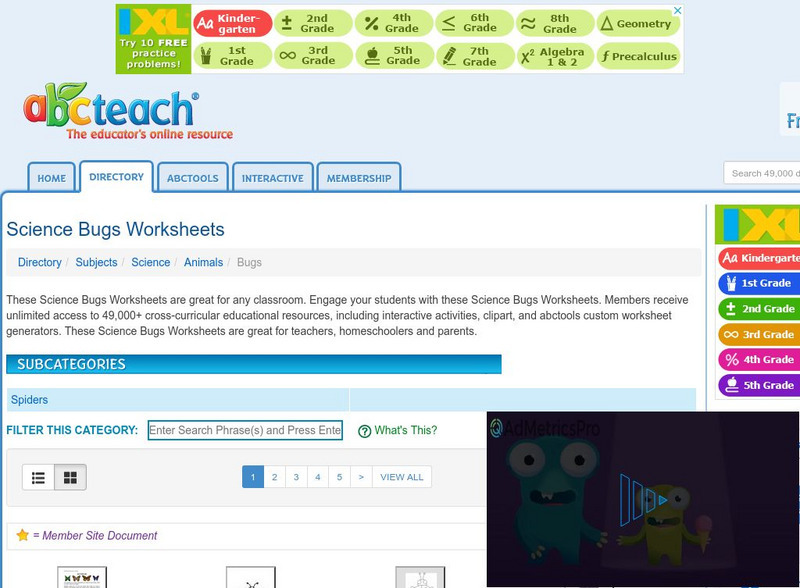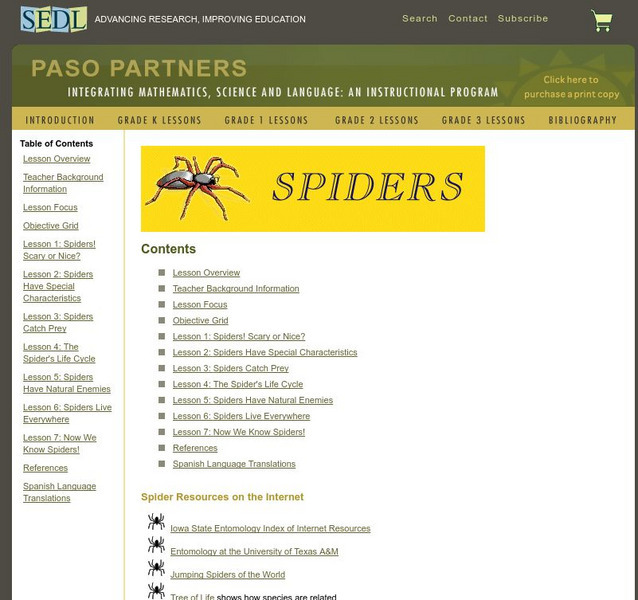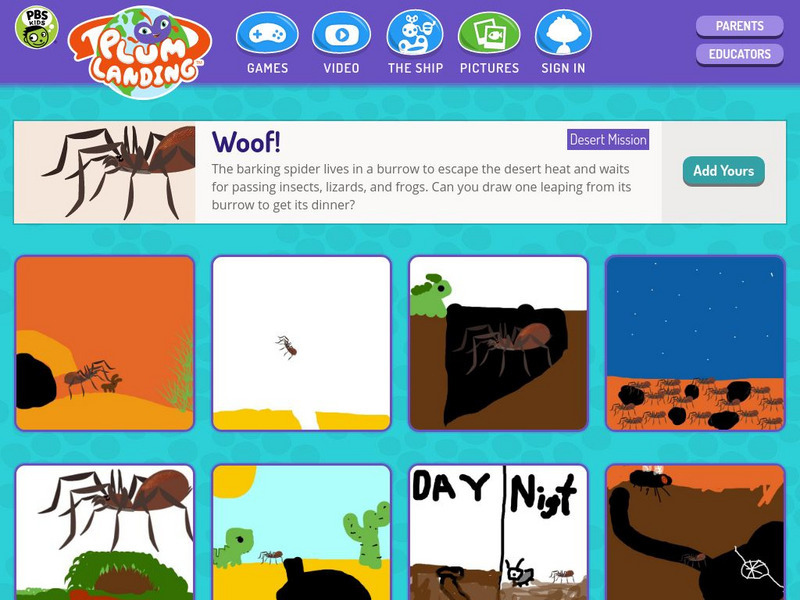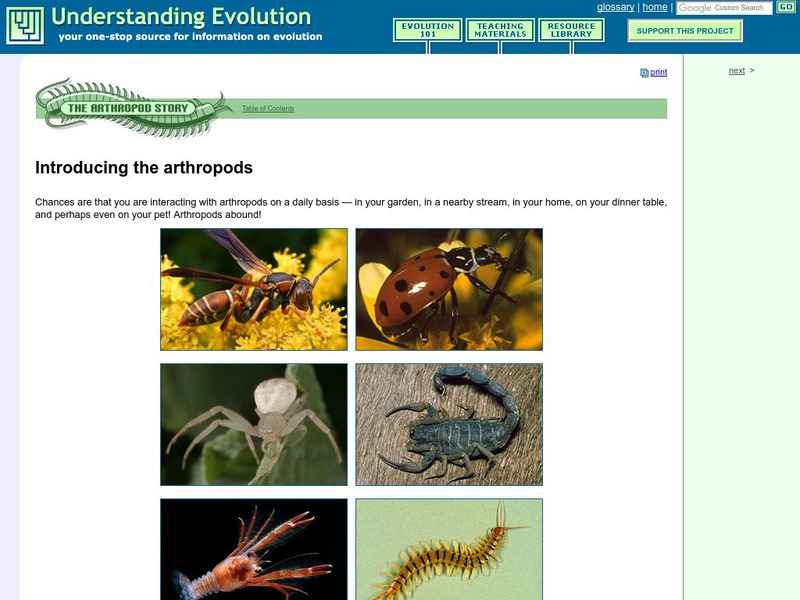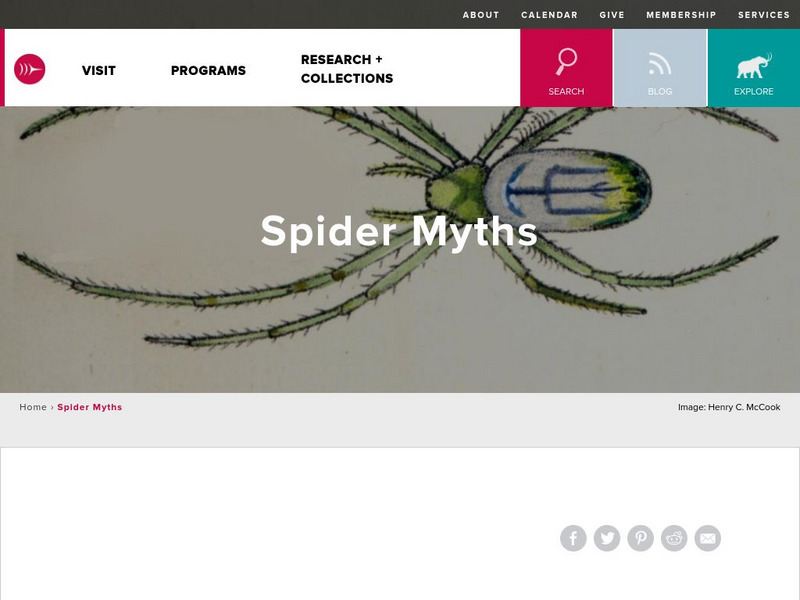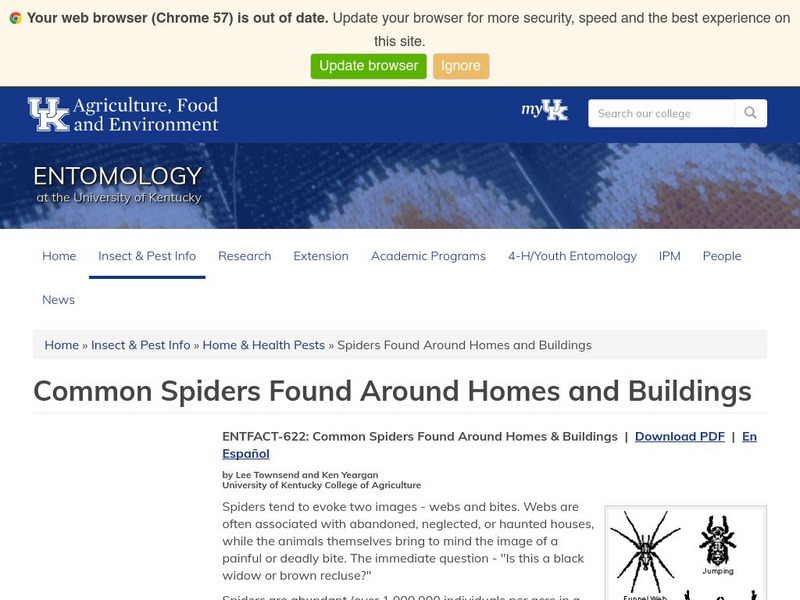Environmental Education for Kids
Eek!: Creepy Critter Feature
Discover all you can about various "creepy" critters, including bats, snakes, spiders, cicadas, leeches, ticks, moths, pupas, lampreys and fleas.
Science Education Resource Center at Carleton College
Serc: A Study of Spider Webs
Many people do not like spiders and consider them pests. However, spiders provide a service to humans. They eat many of the insects that bother people. In this 7th grade life science activity, students will study 4-6 spider webs and...
Sheppard Software
Sheppard Software: Camel Spider
This site gives an in-depth description of a camel spider, including its behavior, appearance, reproduction, and classification. The site includes photos and illustrations and an interactive quiz to test your understanding.
Sheppard Software
Sheppard Software: Animal Profiles: Spiders
In-depth description of a spider, including its behavior, appearance, reproduction, and classification.
abcteach
Abcteach: Insects
[Free Registration/Login Required] Learn about the insect world using activities and lesson plans that emphasize cross-curricular learning.
Society for Science and the Public
Science News for Students: Peacock Spider's Radiant Rump Comes From Teeny Tiny Structures
Male peacock spiders have highly colored hind ends that they shake to attract females. Scientists have now figured out the physics responsible for those hues.
SEDL
Sedl: Spiders
This is a wonderful resource for teachers who want to help children appreciate the place spiders have in the world and lessen their fear of spiders. Includes 7 sequenced lessons/units with detailed teacher notes, student activities,...
Other
Crab Spiders: Family Thomisidae
This resource contains information on the Thomisidae family and offers plenty of pictures. Includes a section on the mating habits of the Genus Xysticus.
Other
Tarantula's Burrow: British Spiders What Is a Spider?
A list of characteristics that a creature must satisfy to be considered a spider, as well as a list with pictures and descriptions of spiders commonly found in the UK.
Other
Tarantula's Burrow: British Spiders What Is a Spider?
A list of characteristics that a creature must satisfy to be considered a spider, as well as a list with pictures and descriptions of spiders commonly found in the UK.
PBS
Pbs Kids: Plum Landing: Woof!
This PBS Kids activity is an extension of a Plum Landing episode featuring the barking spider. Students will learn basic information about the barking spider; students will also use online drawing tools to design a scene with a barking...
University of California
Understanding Evolution: Introducing the Arthropods
This extensive look at the arthropod provides enough information for any budding naturalist, but will also be interesting to one casually interested in insects, spiders, and crustaceans. The pictures are outstanding, and the writing is...
ReadWriteThink
Read Write Think: Did You Say Spiders?
Contains plans for six thirty-minute lessons that ask young scholars to make response journals and multimedia projects about spiders. In addition to objectives and standards, this instructional plan contains links to PDF handouts and...
Burke Museum
Burke Museum: Identifying House Spiders
From the Burke Museum's collection of Arachnology comes this site which seeks to correct misconceptions associated with the identification of house spiders.
National Health Museum
Access Excellence: Terrific Tarantulas
A detailed site about tarantulas, including topics suchs as molting, structure, urticating hairs, and how to handle them.
Other
Billy Bear4 Kids: Butterflies and Bugs
BillyBear4Kids.com is a great butterfly resource with links to butterfly cut-outs, flashcards, bookmarks, crafts, online games, and more. Scroll down for reproducibles.
How Stuff Works
How Stuff Works: Spiders
Basic facts about spiders, with links to related topics, photos and videos.
Smithsonian Institution
Smithsonian National Zoo: Zoogoer Magazine: Surprising Spiders
Mary-Russell Roberson's article, "Surprising Spiders," deals with a variety of topics related to spiders in general, spider species, and spider facts. The focus is on spider types and species including the Brown Recluse, the Portia, the...
Australian Museum
Australian Museum: Arachnology Collection
Australian Museum Online has a collection of arachnids. You can even examine their "feature arachnid!"
BBC
Bbc Nature: Jumping Spiders
Jumping spiders contain over 5,000 species making Salticidae the largest of the spider families. They are widely distributed over the planet and can even be found up Mount Everest. Learn more about jumping spiders in this...
National Pest Managment Association
Pest World for Kids: Bug Builder
Create an ant, a bee, a spider, a cockroach, or a bug of your own design. Use the camera feature to save it to a gallery, and even email it to yourself.
Burke Museum
Burke Museum of Natural History and Culture: The Spider Myths Site
Are spiders insects? Do you really swallow spiders while you're sleeping? Myths and questions related to spiders are addressed on this site. Links to additional information can also be found here.
Burke Museum
Burke Museum: Dangerous Spiders
This site from the Burke Museum which is part of the collection of Arachnology from the Museum centers on correcting certain myths about so-called dangerous spiders. Scroll down to see the dangerous spider myths.
University of Kentucky
University of Kentucky: Common Spiders
Find concise information that chronicles common spiders found around homes and buildings. Several descriptions and pictures are included on this site.






